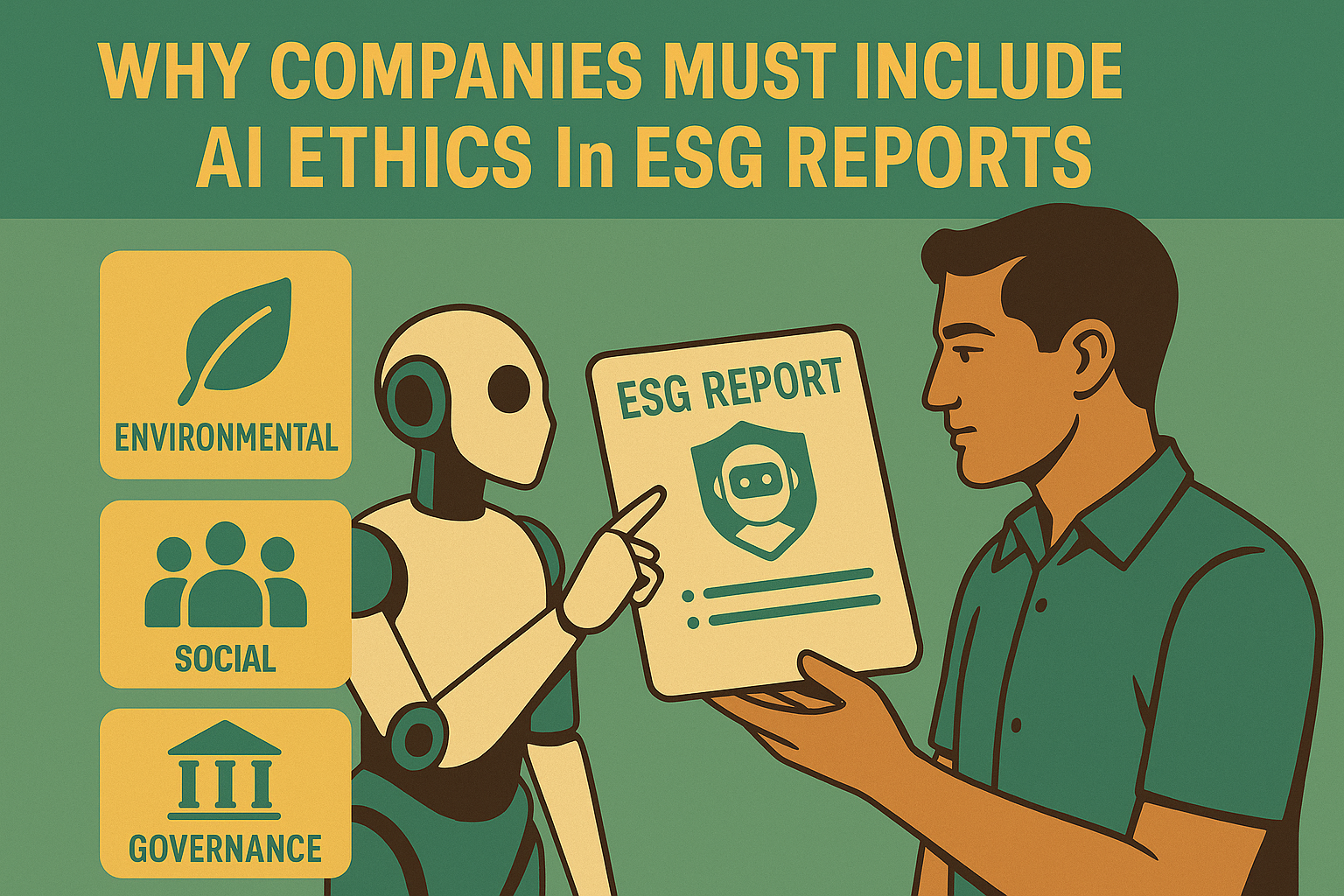Introduction: AI Is Now an ESG Issue
In 2025, ESG is no longer just about carbon footprints and social impact—it’s also about algorithms. As artificial intelligence (AI) becomes deeply embedded in how businesses operate, stakeholders are increasingly asking: how ethical is your AI?
Whether it’s generative models in marketing, predictive algorithms in hiring, or autonomous agents in logistics, AI is shaping decisions that affect people, the planet, and corporate governance. And that means it belongs in the ESG report.
Why AI Ethics Matters to ESG
Traditionally, ESG (Environmental, Social, and Governance) frameworks focused on climate action, labor practices, diversity, and compliance. But AI now intersects all three pillars:
| ESG Pillar | AI Ethics Relevance |
|---|---|
| Environmental | Energy-intensive AI training models, data center emissions, climate modeling accountability |
| Social | Bias in hiring algorithms, surveillance risk, impact on labor markets and accessibility |
| Governance | Transparency in algorithmic decisions, model explainability, oversight and accountability mechanisms |
“AI is not just a technical issue. It’s a governance issue, a fairness issue, and increasingly, a reputation issue.” — World Economic Forum, 2024
Stakeholders Are Demanding Transparency
According to a 2024 KPMG global survey, over 71% of institutional investors said they expect companies to disclose how they manage AI risk—especially in sensitive areas like customer data, recruitment, and public communication.
Other key stakeholders raising the flag include:
- Regulators: With frameworks like the EU AI Act and CSRD, disclosure of AI risks and safeguards is becoming mandatory.
- Consumers: Trust in brands is increasingly tied to ethical tech use.
- Employees: Internal concerns about AI use in monitoring, productivity scoring, or layoffs are rising.
- Media & Activists: Watchdogs now investigate algorithmic harm alongside climate offenses.
What to Include in an ESG Report About AI Ethics
Here’s what forward-looking companies are beginning to disclose:
1. AI Governance Structure
- Does your board oversee AI strategy and risk?
- Is there a dedicated AI ethics or responsible AI committee?
2. Model Transparency
- Are your algorithms explainable and auditable?
- Are affected stakeholders informed when decisions involve AI?
3. Bias & Fairness Testing
- How do you test for discrimination or bias?
- What data governance measures are in place to avoid skewed outcomes?
4. AI Risk Management
- Are there risk classifications or tiering for AI use cases?
- Do you have kill-switch or human-in-the-loop protocols?
5. Sustainable AI Practices
- What is the carbon footprint of your AI models?
- Are models optimized for efficiency and green compute?
Benefits of Reporting AI Ethics in ESG
1. Build Trust
Stakeholders are more likely to support companies that proactively share their responsible AI practices.
2. Get Ahead of Regulation
Frameworks like the EU AI Act, ISO 42001, and the AI Assurance Toolkit are coming fast—early reporting builds muscle.
3. Reduce Reputational Risk
Avoid PR disasters from AI failures, biased models, or algorithmic black-box scandals.
4. Improve Decision-Making
Tracking AI ethics internally creates better, more sustainable AI deployment across the business.
Challenges (and How to Address Them)
| Challenge | Solution |
|---|---|
| Lack of standard metrics | Use emerging guidelines from OECD, GRI, IEEE, and ISO |
| Limited internal AI expertise | Partner with third-party auditors or ethics consultancies |
| Fear of overexposure | Start small—focus on major use cases and scale disclosures over time |
FAQ
Q: Is this only relevant for tech companies?
No. Any company using AI—whether for marketing, HR, customer service, or operations—should report on ethical AI governance.
Q: Isn’t this covered under data privacy?
Partially. AI ethics includes privacy, but also fairness, accountability, explainability, sustainability, and human rights.
Q: Are there ESG ratings that include AI ethics?
Yes. Leading ESG ratings agencies have begun integrating AI governance metrics, and the EU’s CSRD includes digital ethics disclosures.
🌱 Final Thought: Don’t Wait for a Scandal
AI is powerful—but with power comes responsibility. By integrating AI ethics into ESG reports, companies demonstrate foresight, accountability, and alignment with modern stakeholder values.
The question isn’t whether to disclose—but how transparently and meaningfully you do it.



